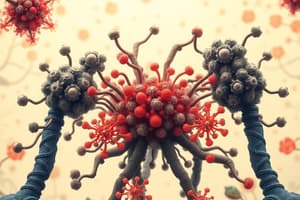Podcast
Questions and Answers
What does pharmacodynamics describe?
What does pharmacodynamics describe?
- The side effects of drugs
- The process of drug absorption
- What the drug does to the body (correct)
- The concentration of drugs in the bloodstream
Which type of agonist binds the same site as the endogenous agonist?
Which type of agonist binds the same site as the endogenous agonist?
- Inhibitory agonist
- Primary agonist (correct)
- Allosteric agonist
- Partial agonist
What is the primary distinction between full agonists and partial agonists?
What is the primary distinction between full agonists and partial agonists?
- Partial agonists activate signaling without binding
- Full agonists do not bind to receptors
- Partial agonists produce a lesser biological effect (correct)
- Full agonists bind only to inactive receptors
Which mechanism describes the relationship between drug concentration and effect for full agonists?
Which mechanism describes the relationship between drug concentration and effect for full agonists?
What characterizes allosteric agonists?
What characterizes allosteric agonists?
Which of the following best describes receptor-ligand theory?
Which of the following best describes receptor-ligand theory?
What happens to the effect of partial agonists as drug concentration increases?
What happens to the effect of partial agonists as drug concentration increases?
Which relationship is typically observed in dose-response curves for full agonists?
Which relationship is typically observed in dose-response curves for full agonists?
What is pharmacodynamics primarily concerned with?
What is pharmacodynamics primarily concerned with?
Which of the following best describes the role of agonists in receptor theory?
Which of the following best describes the role of agonists in receptor theory?
What is meant by the term 'intrinsic drug activity'?
What is meant by the term 'intrinsic drug activity'?
Which component is NOT part of pharmacodynamics according to the study outline?
Which component is NOT part of pharmacodynamics according to the study outline?
How is 'potency' typically defined in pharmacodynamics?
How is 'potency' typically defined in pharmacodynamics?
What distinguishes pharmacokinetics from pharmacodynamics?
What distinguishes pharmacokinetics from pharmacodynamics?
What does the term 'efficacy' refer to in pharmacodynamics?
What does the term 'efficacy' refer to in pharmacodynamics?
Which factor is NOT typically considered when discussing receptor theory?
Which factor is NOT typically considered when discussing receptor theory?
What is the mechanism of action for Ibuprofen?
What is the mechanism of action for Ibuprofen?
Which of the following is NOT a clinical indication for Ibuprofen?
Which of the following is NOT a clinical indication for Ibuprofen?
What type of adverse drug reaction is associated with Ibuprofen?
What type of adverse drug reaction is associated with Ibuprofen?
What primarily characterizes pharmacodynamics (PD) in relation to Ibuprofen?
What primarily characterizes pharmacodynamics (PD) in relation to Ibuprofen?
The decrease in pro-inflammatory prostaglandins by Ibuprofen is achieved through the inhibition of which enzyme?
The decrease in pro-inflammatory prostaglandins by Ibuprofen is achieved through the inhibition of which enzyme?
What is the chemistry description of Ibuprofen?
What is the chemistry description of Ibuprofen?
Which statement accurately describes the relationship between pharmacodynamics (PD) and pharmacokinetics (PK)?
Which statement accurately describes the relationship between pharmacodynamics (PD) and pharmacokinetics (PK)?
What is the primary effect of inhibiting COX-1 and COX-2 by Ibuprofen?
What is the primary effect of inhibiting COX-1 and COX-2 by Ibuprofen?
What role do enzymes play in chemical reactions?
What role do enzymes play in chemical reactions?
Which component of pharmacodynamics refers to the study of receptor interactions?
Which component of pharmacodynamics refers to the study of receptor interactions?
What is meant by the term 'drug target'?
What is meant by the term 'drug target'?
Which statement about receptor-ligand theory is true?
Which statement about receptor-ligand theory is true?
What is a typical function of physiological receptors?
What is a typical function of physiological receptors?
What primary aspect does pharmacodynamics focus on?
What primary aspect does pharmacodynamics focus on?
What do dose-response relationships primarily describe?
What do dose-response relationships primarily describe?
Which of the following disciplines includes the study of drug toxicity and side effects?
Which of the following disciplines includes the study of drug toxicity and side effects?
What does the term 'ADME' in pharmacokinetics stand for?
What does the term 'ADME' in pharmacokinetics stand for?
What type of molecules typically serve as drug targets in the body?
What type of molecules typically serve as drug targets in the body?
What characteristic defines an enzyme's interaction with its substrate?
What characteristic defines an enzyme's interaction with its substrate?
What is the main focus of biochemistry/medicinal chemistry?
What is the main focus of biochemistry/medicinal chemistry?
Which of the following best describes 'pharmaceutics'?
Which of the following best describes 'pharmaceutics'?
What kind of behaviors are analyzed under pharmacokinetics?
What kind of behaviors are analyzed under pharmacokinetics?
In pharmacology, what is typically reviewed regarding disease states?
In pharmacology, what is typically reviewed regarding disease states?
Which of the following aspects does pharmacology NOT focus on?
Which of the following aspects does pharmacology NOT focus on?
Flashcards are hidden until you start studying
Study Notes
Pharmacodynamics (PD)
- Pharmacodynamics (PD) refers to how a drug affects the body.
- Key components of PD include receptor-ligand theory, agonism/antagonism, signaling mechanisms, receptor regulation, and dose-response relationships.
- Drug Target: The primary macromolecule in the body that a drug binds to, causing a biological response.
- Major drug targets are proteins: receptors, enzymes, ion channels, and transporters.
- Affinity: The strength of the bond between a drug and its target.
- Enzymes: Proteins that catalyze reactions by lowering activation energy, enabling specific substrates to convert into products.
- Typical effects of enzymes: E + S ⇌ ES → P (E = enzyme; S = substrate; P = product)
- Physiological Receptors: Transmembrane proteins capable of transmitting a signal involved in cellular processes (signal transduction).
Studying That Suits You
Use AI to generate personalized quizzes and flashcards to suit your learning preferences.




